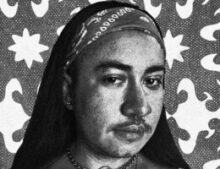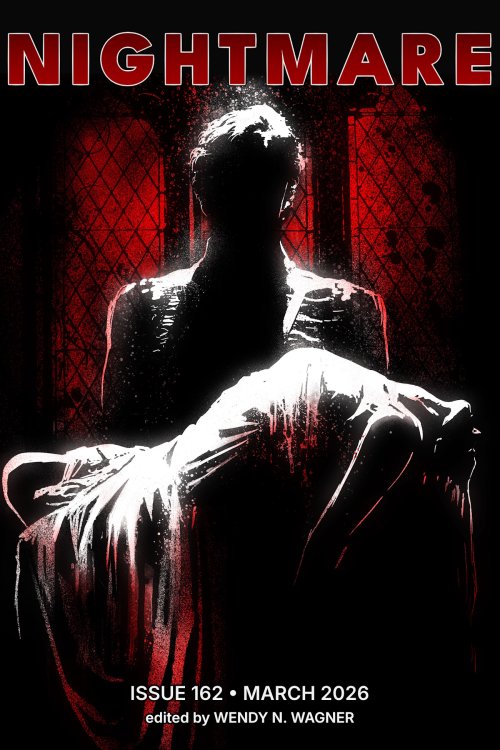CW: body horror, needles.
Little is more crushing than the idea that no matter what you do, you are only capable of destruction, and everyone knows it. I wanted to weave that fear into this story, and to push tenderness and violence up against each other. How can we understand one without understanding the other?
I’d heard the rumors about what happened to those exploring the Sharps House: the mutilations, the flesh stripped from calf bone in shreds of moist tissue paper, the cheek wiped clean off skull to reveal scalded tongue, the decimations. The punctures. But until April, I never went inside. All of the flayings seemed like exaggerations of natural fractures that came from stupid, careless infractions. Any able youth could call themself an explorer and get themself hurt. I was certain that most victims grew drunk on both tall tales and the drink in hand before they broke into the Sharps House, always with something to prove, before landing themselves in a distant urban hospital.
When my friends and I broke in, our motivation was different.
Partially. We weren’t unsober. We weren’t out to investigate any phenomena. Our motivation, in hindsight, was cruel. We treated the Sharps House like an old, arthritic horse. We forced its mouth open to see its ringed teeth for no other reason than we could, then giggled at the fact we’d managed it without being bitten. The unity that cruelty brought comforted us. We refused to consider that our luck lasted as long as it did because the house and its resident were tired, meek, and uninterested in intentional brutality.
We knew just enough to be dangerous.
Just enough to get us past the gate and briar-choked driveway without being caught. Enough to force the front door. To kick aside tetanic debris with boots while we laughed at those before us who’d explored unarmored. Someone had tried cleaning. They’d swept ceramic figurine shards into loving piles, organized crockery, and set the moldy table. We sent their housekeeping to hell:
We hurled bottles against every stained surface, broke rot-fragiled furniture, smashed cobwebbed dishes, scattered silverware, ripped down hanging photos, stomped out what remained of the figurines, tore moth-eaten napkins, and spray-painted antiquities, laughing and howling all the while, a hurricane of joy. We defiled that dead home.
The Sharps House had long been destroyed by invaders. Still, the way it cradled its last possessions—its reputation, its vulnerable reality—made violence so, so satisfying. We relished outdoing the recognizable kudzu, hand, and weather scars.
What we didn’t recognize were the scrapes.
They skinned the hardwood floor in loopy, unbroken trails that ate through the house; they splattered the walls in bleachy thorns. The trails and touches of some pacing dementia patient made of acid. Some spots near the windows were worn to near translucency. The moonlight that leaked through glass, grime, and boards struck these places like lantern light against an ear. The stench of a breakneck plummet to the basement wafted up through them. And where there wasn’t moonlight, there was worse—sewing needles.
Since we lacked a way to satisfactorily hurt them, we let them be. But stray clumps of needles bristled from the scrapes on the walls and floor, silver lines tilting against dark, dark rot. They puzzled everyone. To me, they looked like luminous stems of fungi. A tiny, drowned portion of me thought, They’re beautiful. I didn’t dare say it. I stared at them even as my friends mocked me. Eventually, my friends’ ribbing faded. The needles stayed. I saw their burning slants when I closed my eyes.
They were eyeless. This made them incapable of mending or creating anything. My friends called them nails. Yet I knew they were needles. This fact felt important. I said so aloud before I realized everyone had ventured deeper into the house. I was alone. Then I heard screaming and pounding footsteps in the basement.
The scraping.
All the scraping.
Figures burst from the basement stairwell. My friends. They were less people than a flock of panicked limbs and whites of eyes. Terror and scratches split faces I once knew into dripping, abstract pieces. Neither concern nor recognition lit them. My friends sprinted past me and ripped open the door. I cried out for them; they departed anyway.
The scraping sound pulsed closer. It crunched its way from basement stairwell to landing to sitting room. It was three hundred dried snake spines sticking and unsticking; it was mouthfuls of broken enamel meeting wood. It knitted me in place, even as my friends abandoned me. It overrode any sounds of retreat.
It was less harsh on the senses than its origin.
What resided in the Sharps House was not made of flesh. It was scribbles carved into the surface of existence. A blinding, shifting mass of needles that mimicked people-shape. With every step it took, a layer of floor followed. Oak ripped like fiber. It cut my retinas to look at the thing; my ears bled to hear it. It broadcasted ruin. Immolation. Iron.
It turned towards me, as if it could see past itself, and parted its face. If I had seen a wet pocket of red, I could’ve bore it all. But there was no mouth—just a silver dent in silver hell, endless needles that rasped out a multisyllabic cadence—no hands—just mangled, shooting star imitations of them that raised pleadingly at me—and no body: just an infinity of needles, hunching, impossible.
When the rasping repeated a tenth time I screamed. I bolted. My foot crunched straight through a worn board. I plunged towards the abyss before a burning vice caught my wrist, yanked me up, and tossed me away. Fluid hosed me as I caught myself on the doorframe. I looked.
My wrist was obliterated.
An emptiness. A steaming void. Severed, shredded tubes against pinkish bone against shredded, dripping skin against geysers of blood; when my tendons pulled like little gossamer levers and pulleys, a broken needle rolled under one. It stuck. The agony was so enormous and sudden, I couldn’t comprehend it. My whole body clenched.
I stared as the handful of me gushed out of the thing’s grip, blendered by edges. It splattered onto the floor. Even my blood fled the needles. The thing knelt. It tried to grab a napkin. Decimated it. Tried again, again, until cotton wisps floated over the gore. In a wail of metal, the thing batted the wisps towards me. It cowered. It crawled in my spraying copper. It dipped its mitts into my slush while it rattled in rhythmic bursts. It started gathering a broken dish.
It did not chase me when I fled from it and the fall that had nearly killed me, wristless, friendless, its thousand-razor grip burnt into my phantom flesh, its horrible mantra clarifying in my mind:
why was i made?
why can’t i die?
i want to be gentle
i want to be kind.









